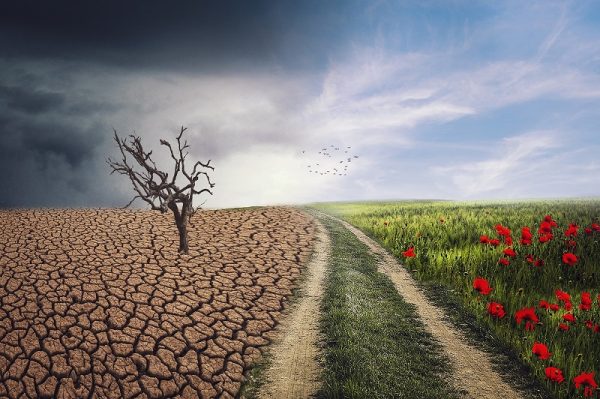| Magdalena Ochwat, PhD; Anna Guzy, PhD |
The Humanistic Forecast for the Climate research project is dedicated to one of the biggest challenges of the 21st century – climate change on a humanistic level. Ewa Domańska, Marek Oziewicz, and Ewa Bińczyk have written about the crucial role of humanities in changing consumption habits and stance towards nature, as well as redefining the categories and values connected to human activities. Ewa Bińczyk also suggests an “ecological adjustment of humanities”[1]. Experts on natural sciences as well emphasise the great role of alliance between natural sciences and humanities in the fight against climate change. January Weiner in an interview for the “Pismo” magazine claimed that “scientists and engineers can show particular solutions to the problem. It is the humanists who must convince 7,5 billion people to use these solutions. They look after values, and environmental protection is the protection of values. Thus, it seems important to support climate science at the same time developing the transformative potential of human sciences. Education should become the spiritus movens of ecological change of the society, especially humanistic education.
In this research, we are interested in the humanistic perspective, including the subject of the Polish language, which in the education process is conducted with the largest number of hours. This subject has certain tools to introduce changes to attitudes and values of young people, i.e. cultural texts, literature, film, photography, sculpture, and appropriate methodologies, which are created by the modern humanities, and within its framework, environmental or engaged humanities. The research area covers primary and secondary schools from Polish cities, especially the cities within our region, which collaborates with educational units. Scientists claim that it is worth carrying out such research in Silesia, where for the centuries the coal mining has been one of the most important anthropocentric activities determining the region’s identity and its perception in Poland and abroad.
Furthermore, the methodology of environmental humanities, which has been successfully pursued worldwide since the 70s of the 20th century, has not found its reflection in humanistic education in both primary and secondary schools. In most schools, no new turn towards the Earth has been done; so far, there has been solely one and trailblazing publication for pupils entitled Literature and Its Nature. Ecocritical Guide for Teachers and High School Students by Przemysław Czapliński, Joanna B. Bednarek, and Dawid Gostyński.
An important premise for this research is the demands of the United Nations, the School Strike for Climate, and the European Union regarding a European Green Deal in order to introduce the complex and updated knowledge about the climatic crisis mechanism to education. This knowledge would be based on the reports by the Intergovernmental Panel on Climate Change established by the UN, and such education could be integrated with the content of school subjects at each education level. Such integration is required due to the complexity of climatic issues and a holistic approach in order to solve them[2].
The report on the research will be based on the results of the questionnaire addressed to the Polish language teachers. The questionnaire will give answers to the question “Whether and how Polish teachers shape pro-ecological attitudes among pupils? It covers five areas: the level of Polish teachers’ competencies of knowledge on climate changes; possibilities given by the current education documents (the core curriculum, textbook, educational programme, reading lists, tasks and exercises for pupils, etc.); barriers in raising ecological awareness; their role in supporting ecological attitudes; suggested solutions activating Polish studies related environments in this area.
The research is to collect unique and complex data covering teachers’ experiences and views regarding the topic of realisation environmental humanities, which will allow for publishing articles in foreign journals, developing educational path of students (future Polish teachers) regarding the area of responsibility for the Earth as well as creating appropriate scientific and educational materials, including scientific works, school text corpus, and classes scenarios.
This research will be the basis for endeavours for a project in the future, which would be an attempt to answer the question of how classes of Polish could become the place for discussion on climate crisis issues often going beyond the scope of traditional philosophical research. In order to introduce such a thought to schools, there is a need for a new way of looking at the humanistic education and new narration (educational materials), and also a coverage enticing to bring up difficult topics, in which no expert feels fully competent as they go beyond the borderlines of the foregoing disciplines.
Environmental degradation will put homo sapiens’ morality, sensitivity, and imagination to the proof, which we are currently experiencing to a small degree but we can see it gradually and rapidly progresses towards a catastrophic direction. The school has to prepare for it, and the “repair programme” in the areas that suffer from the crisis the most is one of the duties and main goals of humanities and social sciences.
The research is carried out by Anna Guzy, PhD, and Magdalena Ochwat, PhD, from the Interdisciplinary Centre for Research on Humanistic Education under the Visegrad The V4 Humanities Education for the Climate. Diagnoses – Best Practices – Recommendations project, which is carried out in cooperation with the Europe Direct Śląskie, a member of the Europe Direct network in Poland. The network is governed by the European Union.
Link to the questionnaire: el.us.edu.pl.
[1] Bińczyk E., Epoka człowieka. Retoryka i marazm antropocenu, Warszawa 2018.
[2] Cf. documents of the United Nations.
Photo from Pixabay






